Empathy is President Biden’s Superpower
Student debt relief. Because we all need help sometimes.
President Biden’s well-known empathy isn’t a weakness in the public debate. It’s actually a strength. Winning the public debate is about getting people to make moral judgements based on our value system. We lose when we try to justify our behavior based on our opponents’ values. We win when we appeal to everyone to live up to ours.
Special Bonus: NYTimes focus group
Intro
President Biden recently launched a plan to provide targeted relief of student loan debts.
Note: The White House communications team prefers the terms “student loan relief” and “targeted debt relief” instead of “forgiveness.” Students didn’t do anything they need to be forgiven for.
They did a brilliant job of predicting an attack from the right and being prepared for it. More importantly, they showed that you don’t have to debate on your opponents’ terms. You can ask people to judge the situation using a better set of values.
The Right is trying to make this debate about education-based class warfare. In their definition of “fairness,” if someone else benefits, that means you lose. The Biden team made the debate about helping each other. Our beliefs are based on empathy, something President Biden personifies. In our perspective, we all depend on each other.
Often our values directly contradict those of conservatives. When these values compete in the public debate, we need to make the case for ours.
WHAT TO SAY: How do we get people to judge this situation based on our belief that we should all help each other? If you expand the debate to include everything we do, we are the ones trying to help everyone. Every time we try to do something to help the working class and people without college degrees, it is the Republicans who stand in the way.
SPECIAL BONUS: I usually analyze my own focus groups, but conveniently, the New York Times published a focus group dialogue about student loan debt relief. This provides a great opportunity to look at how values inform people’s real conversations.
Thank you for reading Reframing America! This is a reader-supported publication.
To receive new posts by email please consider becoming a subscriber. All content is free, but some people choose to become paying subscribers to support this important mission!
A Win for Team Biden
On Twitter, the usual suspects hit President Biden with predictable “class-warfare” talking points. The White House immediately re-tweeted the original posts but added the fact that most of these accusers had themselves been forgiven substantial amounts in Paycheck Protection Program loans.
Debates are about values.
People make political decisions based on what they feel to be morally right. We can frame (or reframe) the debate by getting people to judge what is morally right based on the values we want them to use.
In this case, people usually believe that it is morally right to pay what you owe. That doesn’t mean that it’s the appropriate way to judge this student debt relief plan.
The Biden team did more than just point out the hypocrisy of their attackers. They weren’t arguing that these people shouldn’t have had their PPP loans forgiven. They were reminding people that sometimes we relieve people’s debts for the good of the economy and society as a whole.
What are the values behind our support for student debt relief? Why do we think it is morally right?
Contrasting Core Values
Democrats often say that we don’t have a common set of beliefs because we are a “big tent” with lots of different constituency groups. That’s not true. Our positions are based on a common set of values. They are just deeply ingrained and largely subconscious. We think of them as “what is right and wrong,” as opposed to, “what we believe to be right and wrong.”
We need to recognize that conservatives judge right and wrong by a different set of values. To many people, including many persuadable voters, they appear morally right, assuming you look at things from a conservative point of view. Many of their values have come to dominate the public debate by claiming to be the true “American” values.
Empathy versus Self-interest
All our values come from the core value of empathy, including our belief that everybody has inherent worth. We believe that, as people who live together in a society, we have a moral obligation to take care of each other.
Conservatives believe that human beings are driven primarily by self-interest. They believe that individuals will make rational decisions based on self-interest that collectively lead to the best outcome for the whole society.
Interdependence versus Self-reliance
When asked about core American values, many people would name “self-reliance.” If you stop to think about it, the idea that you could take care of yourself without depending on other people is pure fantasy.
Interdependence is an undeniable fact. Since human beings first formed families and tribes, they have relied on each other for survival and success. The pandemic made us much more aware of things like supply chains and what it means to be an essential worker. Whether you are in a small community or a huge city, you depend on thousands of people before you even wake up in the morning.
Self-reliance is actually a destructive myth. It denies the reality of our mutual dependence and tells people that 1.) they are morally bad for needing help and 2. they have no responsibility for the well-being of others.
Cooperation versus Competition
In the competition frame, life is a zero-sum game; someone else’s gain always has to mean your loss. There is a limited amount of stuff and the only fair way to distribute it is through competition. As long as the competition is fair, winners deserve to win and losers deserve to lose.
In the cooperation frame, there should be enough for everyone. We need all kinds of different people to play all kinds of different roles. We know that if we work together, we can all succeed.
How do these conflicting values fit into the student loan forgiveness debate?
The Focus Group
In a New York Times focus group about the economy, participants got into a heated discussion about the student loan forgiveness plan. The focus group was moderated by Frank Luntz, the most effective language strategist on the Right.
Here are some recurring themes:
Helping Each Other
The progressives and liberals in the group repeatedly brought up the idea that we should do things to support each other.
“Hey, we’ve got to do something for somebody. The student loans and the Inflation Reduction Act were fantastic.”
“We help our kids, we help our neighbors, and we help our community, because that’s how I was raised.”
“I don’t have children, and I pay for schools.”
“My tax dollars paid for your education, since you were in the military.” (to a conservative who says the Army paid for his education.)
An interesting conversation started but was shut down by Frank Luntz.
Chris: “What if your neighbor’s house is on fire? Do you have a problem with the fire department who you pay taxes to putting the fire out?”
Rich: “That’s different. You’re mixing apples and oranges.”
Chris: “Oh, is that different?”
Moderator, Frank Luntz: “Hold on. Hold on. Hold on…Why is this issue so animating to you, why are you so engaged?”
As a focus group moderator, I know that this is exactly the kind of exchange you want to encourage to see where it goes. It is very unusual for a moderator to interrupt in this way, to stop an intelligent line of questioning from getting off the ground.
“Fairness”
Two of the more MAGA conservatives dominated the conversation.
“You’re asking these blue-collar workers to subsidize white-collar workers, and it’s just not fair.”
“It’s unfair to those that actually paid back their loans. On top of that, half of America doesn’t have a degree. So you’re throwing them under the bus. They’re paying for somebody else’s college education, somebody who’s making more money.”
“Why should those people be punished or have to pay for irresponsible parents and irresponsible kids?”
These guys also believed that we were better off economically under Trump and that the IRS was going to knock down your door. Their minds are not going to change, no matter what we say.
There were two other conservatives who agreed with them.
“We didn’t go to college. My husband has been in law enforcement for 33 years, and he makes good money. But I don’t think it’s fair that we have to pay for everyone who did.”
“I personally will be benefiting from this $10,000 student loan forgiveness, and I’m against it on the principle of fairness.” (When asked, he laughed at the ideas of giving it back or to charity.)
These two, plus the participants who observed but did not comment on this discussion, could potentially have been influenced by the prematurely interrupted “fire-department” debate.
Reframing the Debate
We all pay for the fire department because we feel that it would be inherently wrong to just sit by and do nothing while your neighbor’s house burns to the ground, and also because we never know when we’re going to be the one who needs it.
The fire department analogy is an excellent way to evoke both the moral responsibility to care for others, and the understanding that, at some time or another, we are all in the position of needing help.
This is exactly the way we want people to see and judge this situation.
Expand the scope of the debate.
We have to expand people’s perspective from this one plan to the bigger picture. There are many different things we do to help each other, but not every program is for everybody.
Here is what Alexandria Ocasio Cortez had to say in a series of insightful Instagram posts.
"It all comes around…It's okay. We can support things we won't directly benefit from."
"In light of the ecological, economic, and social challenges we face, our society's ability to triumph and prevail actually depends on our capacity for SELFLESSNESS over SELFISHNESS…That's why if you're upset now about student loan forgiveness, you are not ready for climate change."
"When crisis finds us (and it always does) it requires us to rely on others…and that will be difficult to nonexistent if you spent your life fighting against our capacity to help one another in many other different ways even if we don't immediately benefit in the short run."
I love how she describes selfishness and inability to rely on others as a weakness, a form of immaturity, and portrays selflessness as a capacity we need to build as a society.
Put our opponents on defense.
We have to get people, especially journalists, to ask the right questions. Republicans want people to ask us, “Why are you only helping people with college degrees?” We want people to ask Republicans, “Why do you never do anything to help working people? Why do you block every effort to help anybody except the very rich?”
SAY THIS:
“We all should be helping each other all the time. Each piece of legislation is just one part of the process. But every time we try to help working people by say, raising the minimum wage, providing affordable child care, or making community college free, Republicans block it. Student loan debt relief is just one thing President Biden can do to help people that Republicans can’t block.”
“Conservatives seem to think that the only way to help people is to never help anybody. Yet they still seem to be fine with helping the greedy rich and sticking everybody else with the bills.”
“You guys (Republicans) even voted against stopping gas companies from price gouging and lowering the cost of insulin. Tell me one thing you have voted for that would help working people?”
There is a very long list of efforts to help working people that Republicans voted against. It includes but is not limited to: universal preschool, lower prescription drug costs, child tax credits, increased earned income tax credits, building more affordable housing, family and medical leave, adding dental and vision coverage to Medicare, assistance with elder care and clean energy jobs.
What not to say.
This post is already way too long! I’ll skip the detailed analysis of what not to say in this case. Just remember the rules:
Do not post, share, comment on, or otherwise draw attention to their attacks, not even to criticize them for attacking us or to refute their arguments. Never repeat the language they use to attack us. Do not assume people understand what is wrong with their arguments. Do not insult people for seeing the situation differently than we do.
For more on how to not get tricked into promoting their messaging, see my previous post, Part 1. They light dumpster fires. We have to stop adding oxygen.
Make the case FOR debt relief.
Instead of responding to their arguments, make the affirmative case for why we need to do this in the first place. The larger case we are making is that helping people is the right thing to do. Talking about why people desperately need student loan debt relief is consistent with that larger framing. See NOTES below for more on this.
The Bottom Line
Our opponents have a narrative in which we are bad, because we want to forgive some of the debts of those who got a college education, and somehow in doing so we are being unfair to those who did not. Their narrative involves a world that is based on self-reliance, scarcity and zero-sum thinking: for someone else to gain, you have to lose.
We have a counter-narrative in which it is good to relieve people of excessive burdens, because everybody needs help sometimes. Our view of the world is based on the idea of interdependence, cooperation and abundance. We have to keep the debate focused on the idea that, as Paul Wellstone said, “We all do better when we all do better.”
We use government to help people, but we use different programs to help people in different ways, depending on what they need. Don’t complain because one plan doesn’t help a certain group of people. Vote for all the other bills that do help those people!
Thanks, as always, for reading. I hope you are able to use this in your work and your activism!
I look forward to your feedback and ideas.
Warmest Regards,
Antonia
NOTES: The case FOR debt relief.
FACT SHEET: President Biden Announces Student Loan Relief for Borrowers Who Need It Most
SAY THIS:
“Many people take out student loans for training and professional certification.”
“The cost of four-year college, public and private, has nearly tripled since 1980, even accounting for inflation.”
“Our society puts too much pressure on kids, telling them that they have to get a college education if they want to have any kind of future.”
“The whole student loan system is broken and needs to be completely overhauled.”
“Private companies that manage student loans have deceived kids about the true costs of their loans. They don’t understand things like compound interest and capitalizing interest. Students make payments for years, only to have the amount they owe grow larger and larger.”
Quotes from focus group participants:
“When I went to college, it was a lot cheaper…Universities have to take responsibility for the fact that so much of the population is in student loan debt.”
“I was told my whole life to go to college. We have an entire economy in this country built specifically around sending kids to college, so they can sign a promissory note when they’re 18 years old. I know people who have made faithful payments for the last decade on their loans, and they have a higher balance, in the six figures, now than they did when they took them out. If that doesn’t make sense to you, it doesn’t make sense to an 18-year-old either.”
“There are lenders out there that are absolutely taking advantage of students and their families.”

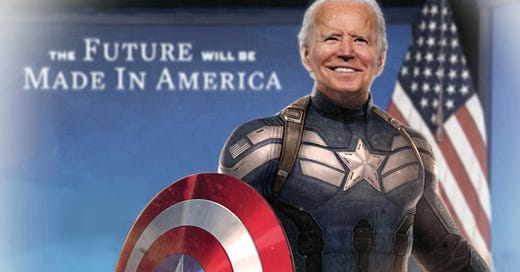


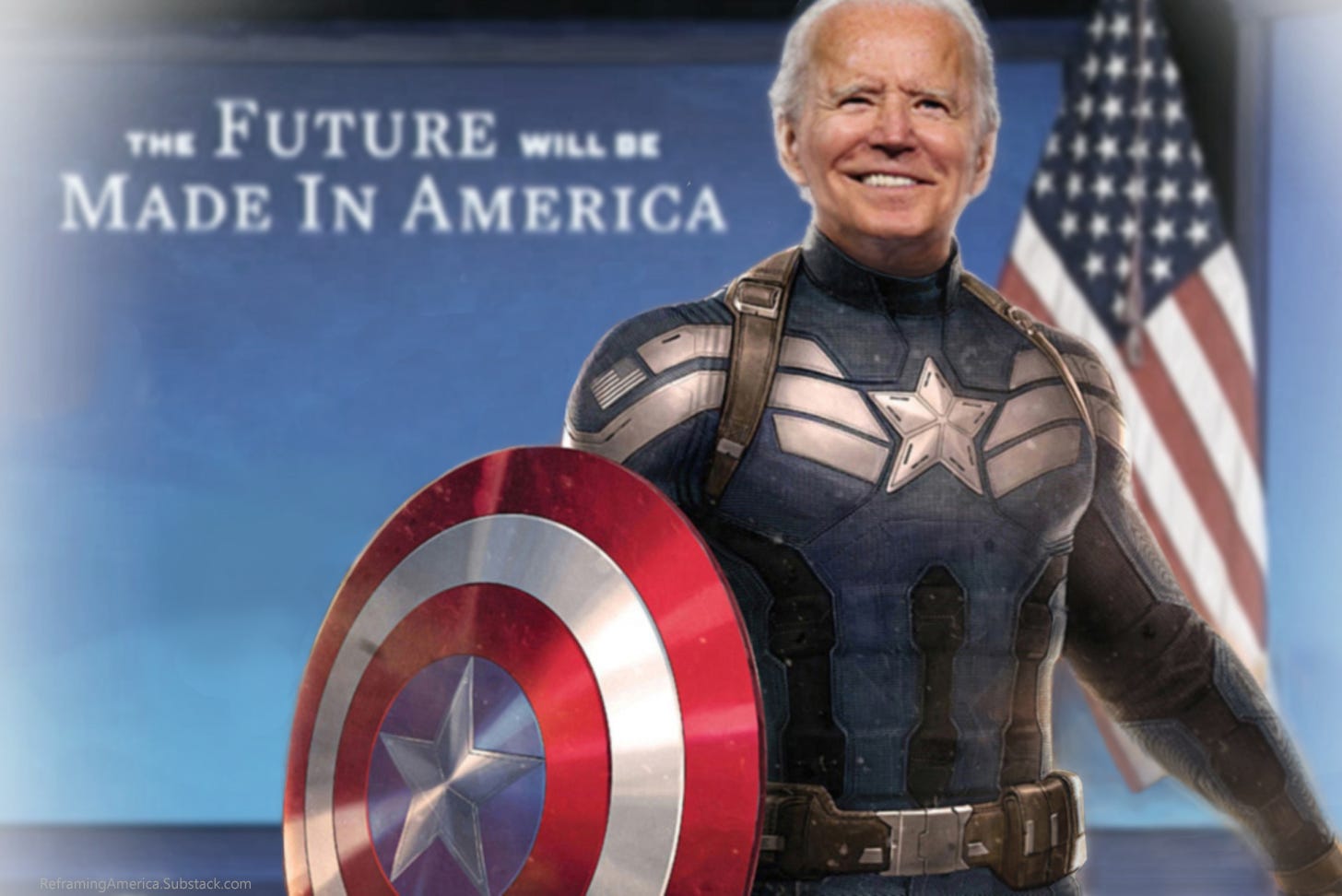

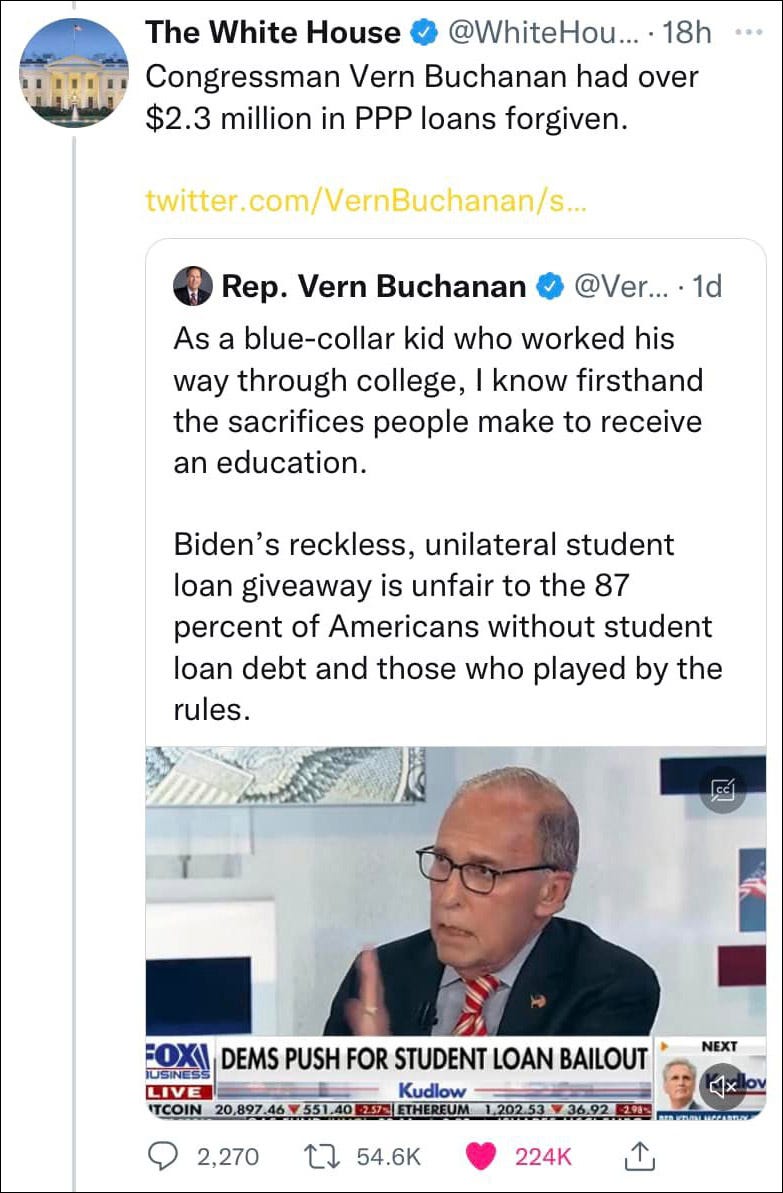
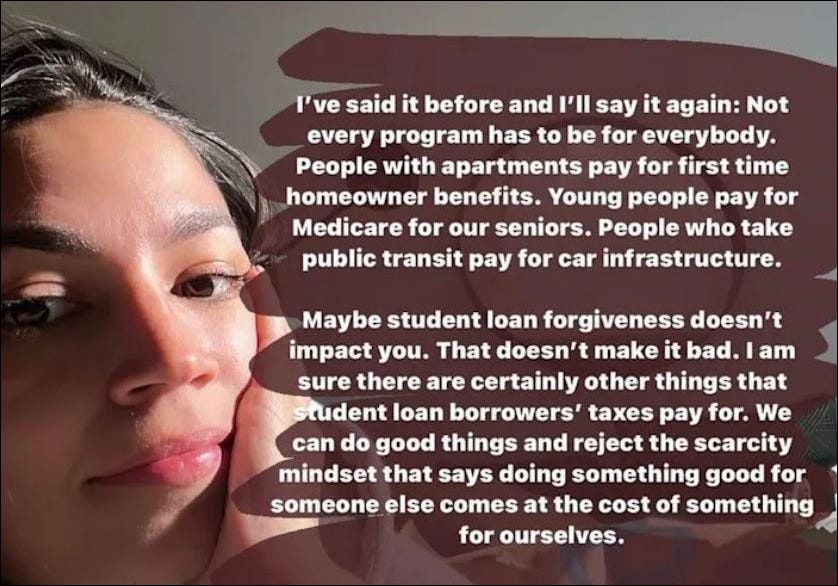
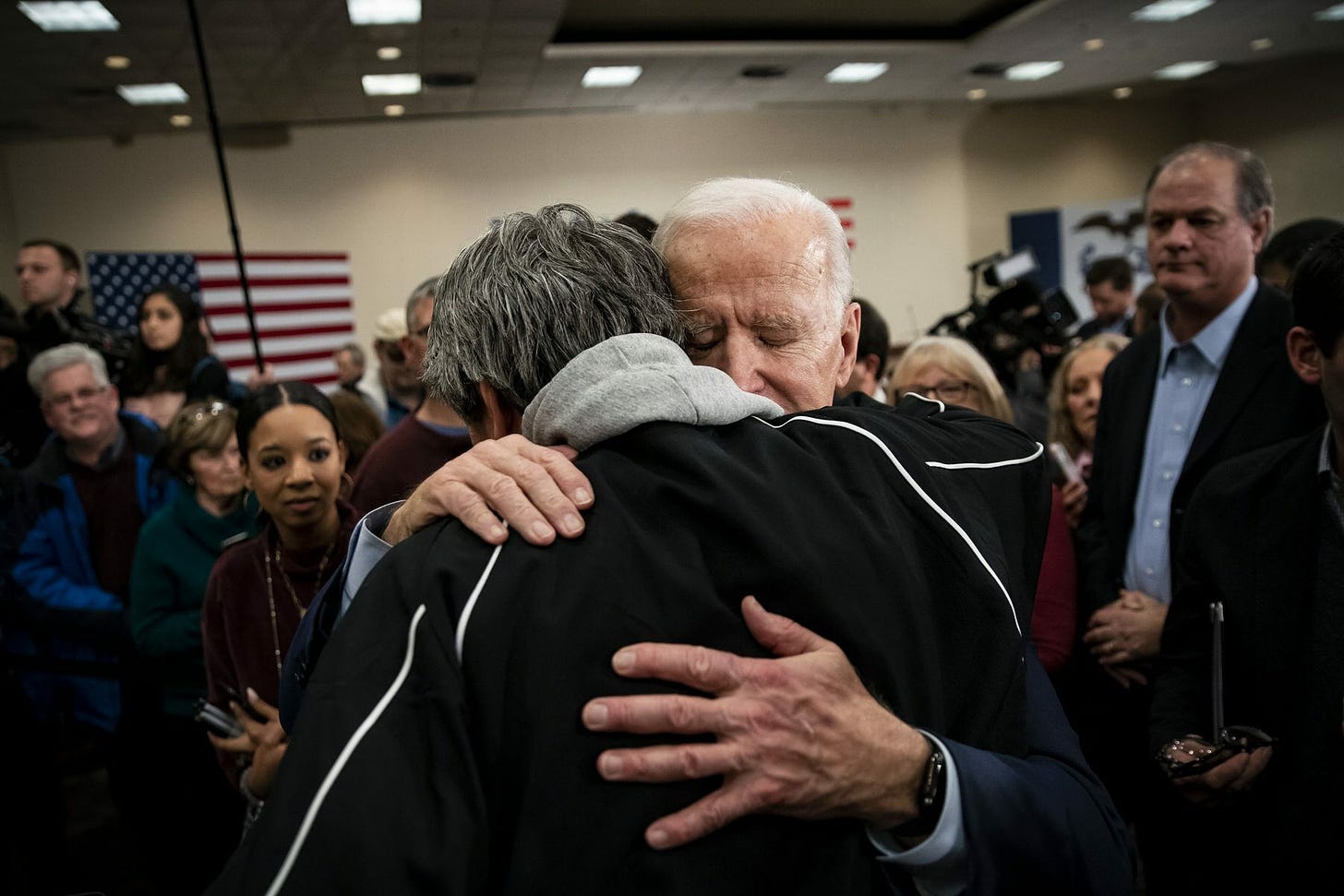
We need funding directed at smart professionals like Antonia Scatton and Celinda Lake to conduct focus groups that are highly revealing n truth seeking, n not interrupted for political reasons by a F Luntz.
I love Antonia's analysis. This student loan relief issue is about whether we want to live in a highly divided society ruled by mistrust n with, for instance, no police or fire dept helping a neighbor in need, OR we want to live in a truly interconnected, diverse and empathetic society where most have an opportunity to thrive.
Sometimes we relieve debts of hardworking people for the good of the economy n society as a whole. We also do it to build a more empathetic society that values cooperation. We don t have to compete against each other 24/7.
We say someone wins n WE ALL win n it s the right n decent thing to do!!! The other side preaches radical individualism n that everything is a zero-sum game. A former low-income student wins, hence you (white male who may have been saved by PPP debt relief) loses.
The focus group discussion was interesting! “Hold on. Hold on...” very telling. I wonder if there’s video of it because I’d like to see it.